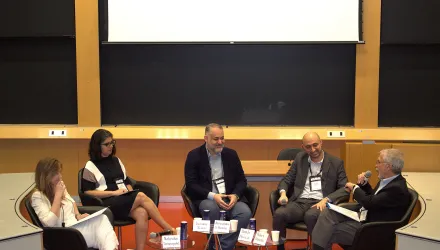Andrei Illarionov, Senior Economic Advisor to Russian President Putin since 2000. Received a Ph.D. in economics from Saint Petersburg State University.
In the early 1990s, as advisor to Yegor Gaidar (Yeltsin’s early architect of economic reform), Illarionov forged a reputation as an “independent thinker” by harshly criticizing the government for failing to curb inflation and for torpedoing liberal reforms by compromising with the industrial lobby.
He is known as one of the few liberal, Western-oriented economists in Russia, and since 2000, he has been openly critical of the Russian government’s slow pace of market-oriented economic reform.
Recently, Illarionov has warned that Russia risks jeopardizing economic growth by drifting away from market reforms and towards more state intervention; he has raised serious accusations against the Russian government for curtailing “personal rights” and freedoms; he has called the Yukos case a “Pandora’s Box” that has unleashed undemocratic forces in Russia; and he has referred to a general “atmosphere of fear” throughout Russian society.
Illarionov condemns Russia’s recent ratification of the Kyoto Protocol, calling it a “single big lie” and a “death pact.” He argues that capping Russia’s emissions could hamper economic growth, and questions the scientific evidence for the link between emissions and global warming:
Illarionov, “Kyoto will cripple our economy and make our country less able to achieve badly needed economic growth, thereby harming our poorest citizens the most,” Financial Times, October 22, 2004.
Illarionov, “The decision to ratify the treaty was motivated purely by politics, not by science or economics,” Financial Times, October 14, 2004
John P. Holdren is the Teresa and John Heinz Professor of Environmental Policy and Director of the Program on Science, Technology, and Public Policy at the Kennedy School, as well as Professor of Environmental Science and Public Policy in the Department of Earth and Planetary Sciences at Harvard University. Trained in aeronautics/astronautics and plasma physics at MIT and Stanford, he previously cofounded and co-led for 23 years the campus-wide interdisciplinary graduate degree program in energy and resources at the University of California at Berkeley. He is Chair of the Committee on International Security and Arms Control of the National Academy of Sciences and was a member of President Clinton's Committee of Advisors on Science and Technology (PCAST). In connection with PCAST, Holdren chaired studies for the White House on protection of nuclear-bomb materials, the U.S. fusion-energy R&D program, and energy R&D strategy for the climate-change challenge.
Robert N. Stavins is Albert Pratt Professor of Business and Government, Chairman of the Environment and Natural Resources Faculty Group, and Director of the Environmental Economics Program at Harvard University. He is a University Fellow of Resources for the Future, former Chair of the U.S. Environmental Protection Agency's Environmental Economics Advisory Board, and a member of the editorial councils of scholarly periodicals. His research has examined diverse areas of environmental economics and policy and has appeared in a variety of economics, law, and policy journals, plus several books. Stavins directed Project 88, a bipartisan effort cochaired by former Senator Timothy Wirth and the late Senator John Heinz, to develop innovative approaches to environmental problems. He has been a consultant to government agencies, international organizations, corporations, and advocacy groups. He holds a BA in philosophy from Northwestern University, an MS in agricultural economics from Cornell, and a PhD in economics from Harvard.



